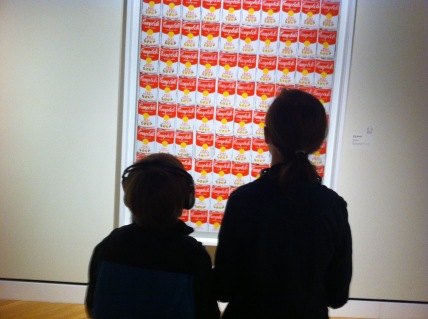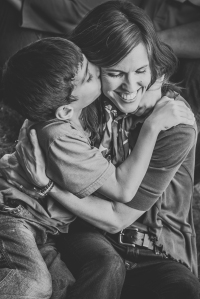The longer our beautiful, diamond-in-the-rough is home with us, the more the wreckage of his soul is apparent. I shudder at it. I can’t imagine how he has endured. The torture he’s lived through is unthinkable. And I am not pointing any fingers because I know that every person that hurt him with the sins of things done or the things that went undone, were people with their own pain and their own doing-the-best-I-can stories. Or they were just children, too.
One of the hardest parts of all of this is the way that everything is so unclear, so surreal sometimes. His words say one thing; his behaviors say another. He tells us about something from his past that doesn’t fit with other things he’s told us or what we “know” of his history. He finds a way to upset the happy moments everytime we get there because chaos and drama feel safer somehow. He tells ridiculous, bold-faced lies for next to nothing. He is kind and endearing one moment, only to turn into a manipulative con-artist the next. He charms acquaintances and proudly declares he would prefer these people as his parents because he “loves” them. He loudly proclaims his entitlement to be treated as a king in our home, all the while, obviously believing he is nothing more than dirt on the floor. He provokes in order to look like the victim, yet he hates his powerlessness with a passion. I can’t say who or what he is. I know there must be a treasure of a boy in there….the one God dreamed up and created….but I have barely caught a glimpse of him and I am not even sure I have yet. What is real and what is not? So much of what he lets me see is smoke and mirrors. What I see is, sadly, mostly mental illness.
In the midst of caring for this child, I also care for one good man and three other children. I’ve never been great at caring for myself. I’ve grown in it, over the years, learning to take time to be alone, to be with friends, to do something just for myself, to say no to things not aligned with my highest priorities, to eat well, to exercise (sometimes). But this one little boy has launched me into a whole new level of self-care. Previously, I learned to step away from busy life for awhile. I learned to say “no” to some of busy life. But I had never learned the kind of self-soul-care I am going to describe next.
Many of the dysfunctional, unhealthy behavior patterns that he exhibits just piss me off. There. I said it. I struck through the words so you would know it isn’t really acceptable to me either. Do what you want with it. If you’ve never lived with narcissistic personality disorder or ODD or RAD, don’t judge! (And no, he doesn’t actually have those diagnoses, but his behaviors line up with them some of the time.) So here I am. I love Jesus. I am trying to love this little boy who is not just being a sassy kid with an attitude. It goes so far beyond that. And I know I’m supposed to be connecting first, hearing the fear behind his behaviors, just understanding where he’s been and what he’s been through. But he just pushed a big, red button. And I want to scream. And punish. And leave. Because I am scared, too.
Enter Christine Moers’ phrase, “Out crazy the crazy.” Some of my other adoptive mom friends have told me about humor and the roll it plays in their lives of living with kids from hard places. But I never gave it much weight for myself, because I am not funny. I don’t laugh a whole lot. Especially not when I am mad. Or when I am dealing with really heavy, sad, frustrating issues. Obviously.
But one day I saw Christine Moers (an adoptive mom and therapeutic parenting coach) had posted this video (when your kids are stuck) of how she “out-crazies the crazy,” which translated by me means this: when your child is engaging in surreal-dysfunctional-upside-down-crazy behavior, just be crazier. It throws them off, breaks the tension, and creates a protective coating for the soul of the person who is trying to love this child through the craziness. It’s like an inoculation so I can love on my child and not get sucked into the black hole of the craziness he is in. It is self-care at a level I have not really tried before.
So, I tried it. That very day after I had watched the video. We were in the grocery store, and he started in on the whining, reproaching, and accusing. This time it was because I do not buy Fruit Loops. And I knew that nothing I had tried was going to work. Ignoring? Nope. Coaching? Nope. Empathy? Nope. Threats? Nope. I could feel the irritation rising so I just did it. Crazy. I began to cackle like an old witch rubbing my palms together in wretched glee, “I love to make my children eat nothing but broccoli! I am the worst mother in the world! Ahhhaaaahahhahaha (evil laugh)” And it worked. He smiled and moved on. No more about the Fruit Loops.
And since then, I’ve tried it multiple times, and IT IS GOOD. It is a marvelous self-care technique! I have lovingly dubbed him “the cray-cray kid.” It is silly, and he has no idea what I am talking about. It’s so much nicer and less morose than many of the other labels I’ve tacked onto him in my mind. It is a light-hearted way of being with him when he is difficult to be with. So sometimes when it all starts, I become the boxing announcer, “And in the blue corner, we have the one, the only, the faaaaaaantastic Cray-Cray Kiiiiiiiid! And in the other corner, wearing a big grin, is Suuuuuuper Mom, the cray-crrrrrrray champion of the world!” And I start shadow boxing and out-crazying the crazy.
Fast forward to last Thursday. I desperately wanted to go to an art exhibit at Crystal Bridges, and there were just days before it moved on. I was nervous about taking this child to an art museum; anything could happen. But the pull of Pollack and Kahlo, Matisse and Van Gogh were stronger. I knew I might feel resentful if he “ruined” our time there. But I decided that I would not let fear take this chance from me. Self-care is sometimes risky.
And so we went. And mostly, we had a wonderful time. Oh, there were a few hiccups. But there was also an audio-tour device and headphones which kept him busy and happy punching buttons. He had no idea what he was doing or listening to, but it looked and acted like an iphone, so he didn’t care. And it had a strap for his neck so I wasn’t worried about him dropping and breaking it. And he heeded my warning about losing the privilege if I saw the headphone cord in his mouth. He did not chew through the headphone wire! WIN! And my other three were mesmerized and actually studied the pieces and did not get bored. And I soaked it up and felt so rich.
Our last stop was the museum store. That’s a fun place, too. We were browsing the novelties, kids mostly following my instructions to not. touch. anything. They wanted me to snap photos of things they liked. We got tickled about some stuffed dolls made to look like famous artists. There was a Vincent and a Frieda and, of course a Salvidor Dali dolly! So while I was focusing in on the Dali dolly, Elijah stepped into the photo. A funny thought slipped into my mind…The Kings of Surrealism: Salvidor Dali Dolly and The Cray-Cray Kid! And I started laughing and couldn’t stop. And it’s so good because instead of crying, instead of getting mad that this is the life we have now, I just laughed.
As we left, I asked for one more photo, proof that we had been here and had prevailed! I said, “Okay, everybody, look at the camera!” I didn’t even ask for smiles which would be just too much. This is what I got:
And yes, the look away was intentional….we tried it multiple times with the same result…because it was my idea (looking at the camera) and not his. But did I get mad? Or let it touch my emotions at all? Heck, no! I am the Cray-Cray Queen!









